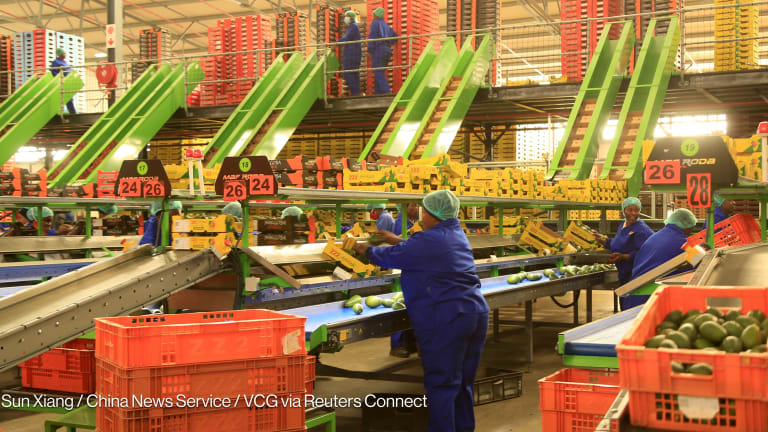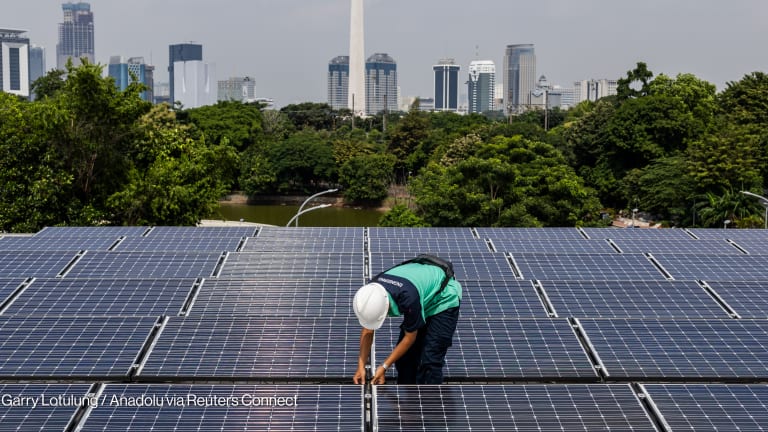Q&A: JICA VP talks Japanese support in Africa
Japan International Cooperation Agency Vice President for Africa Hiroshi Kato spoke to Devex about the agency's future development plans on the continent.
ABIDJAN — The recent signing of a $300 million private sector loan assistance agreement between Japan and the African Development Bank highlighted a growing Japanese interest in maintaining and expanding its presence on the continent. The Japanese International Cooperation Agency currently operates programs across two-thirds of the continent, primarily with an eye to improving and encouraging a robust private sector. “My impression is that the international community is now starting to realize the importance of private sector-driven economic development, which will eventually help countries to reduce poverty,” JICA Senior Vice President Hiroshi Kato told Devex. “In some countries and areas, Africa is more ready to receive a new type of cooperation that Japan has consistently been advocating.” Africa is the second largest recipient of Japanese aid behind Asia. Last year, Japan Prime Minister Shinzo Abe announced the country’s plan to invest $30 billion in African infrastructure development, education and health care expansion over the next three years. To date, Japanese investment has focused on infrastructure projects, including urban planning, power, water or transport development, as well as technical projects to build the capacity of authorities. Other projects have included primary school education funding, as well as tertiary education and vocational training at “centers of excellence” that stress science and math education. In the years to come, Kato said Japan plans to enhance its flagship Africa Business Education program — a master’s exchange program in Japan that offers scholarships to young Africans. “Africa seems to be positioning itself to receive this type of international activity rather than being limited solely to poverty reduction support,” explained the Africa portfolio VP. Devex spoke to Kato about future development plans on the continent. Our conversation has been edited for length and clarity. JICA has investments and programs across Africa. Do you foresee any regional focus going forward? We are not former colonizers of Africa, so for better or worse, we don’t have a really deep relationship with Africa. We are, in a sense, a very remote partner. We have a policy from which we deal with as many countries as possible. But of course, international cooperation is driven by mixed motives: diplomatic, economic and developmental. So the combination of these considerations make us put some priorities on some countries over others. From the economic point of view, dynamic countries such as Kenya, Tanzania, Ivory Coast and Rwanda are some countries where the Japanese private sector is very much interested, and therefore we tend to put focus on those countries. But other countries that are not necessarily economically dynamic, such as Sierra Leone and Liberia, are a different target for example in health systems development. Other fragile or conflict countries, such as the Democratic Republic of the Congo and Uganda, are countries that need help, so from the diplomatic and humanitarian considerations, we provide a substantial amount of aid. So it’s a mixture of economic, developmental and diplomatic considerations. Can we expect more JICA cooperation and interaction with the AfDB and other African institutions? Big companies move only when they have big business opportunities. We see the large potential in tapping into SMEs. --— We see the African Development Bank as a very important partner, because we are rather a latecomer in Africa. When we want to expand our activities in Africa, we need to rely on some reliable institutions, and AfDB was one of them. We now have a joint financing mechanism called “enhanced private sector assistance” [or EPSA] to Africa, from which both the African Development Bank and JICA have financed projects jointly or parallely, because we were new in providing loans to African countries. Traditionally, grants and technical cooperation have been the major instruments we have used in Africa. We began expanding our loan financing most recently. In order for us to find good projects to finance through our loan instrument, we need to rely on the project finding and capabilities of the AfDB. The idea of EPSA, as evidenced by its name, is that the private sector is going to be a priority in JICA’s portfolio in Africa in the coming years. We also have other facilities that we are going to use to encourage the private sector of Japan to be more active in Africa. We have a variety of facilities especially to encourage the small and medium [Japanese] enterprises to be more active in Africa. The assumption behind that is that SMEs have appropriate technology that is usable in the developing world, especially Africa; they are quick at making decisions; and they don’t require big projects like the firms. Big companies move only when they have big business opportunities. We see the large potential in tapping into SMEs, so we are encouraging them to be more active. Generally speaking, a lack of knowledge still persists in Japan, and we need to enlighten them of the potential of Africa, and that is JICA’s responsibility. --— What are the factors that still limit JICA assistance in Africa? We are eager to encourage the private sector of Japan to be more interested in Africa. As a development agency, we see a lot of potential on the continent, but that perspective is not widely shared by the private sector in Japan, unfortunately. They don’t know much about Africa and they see Africa as a remote continent. The Japanese private sector, especially construction-related, infrastructure-related companies, are very busy working in Japan or Asia or in North America or Europe with a lot of business to do. They’re too busy to go beyond the Indian Ocean. Generally speaking, a lack of knowledge still persists in Japan, and we need to enlighten them of the potential of Africa, and that is JICA’s responsibility. What can African countries do to become a more attractive investment location? First and foremost, the political stability is very important, and safety, even in some countries where the prospects are bright. Cote d’Ivoire is recording a growth rate of more than 6 percent over the past couple of years. But still, there are signs of uncertainty here and there. If something happens, the psychology of the private sector changes very quickly, and I think general political stability and the security and safety of residents is very important. Secondly, there are an increasing number of countries led by development-oriented leaders. Ethiopia and Rwanda are examples, but they still think that it is the responsibility of other countries to bring the private sector to their countries. Sometimes they will ask JICA to bring the private sector, but that’s not how the private sector behaves. The Japanese private sector is especially risk averse. And unless they are certain they can invest in very favorable conditions, they will not make a decision. [Countries] have to know that it is their responsibility to support the private sector and not that of an outside agency or development organization. Devex delivers cutting-edge insights and analysis to the leaders shaping and innovating the business of development. Make sure you don't miss out. Become a Devex Executive Member today.
ABIDJAN — The recent signing of a $300 million private sector loan assistance agreement between Japan and the African Development Bank highlighted a growing Japanese interest in maintaining and expanding its presence on the continent.
The Japanese International Cooperation Agency currently operates programs across two-thirds of the continent, primarily with an eye to improving and encouraging a robust private sector.
“My impression is that the international community is now starting to realize the importance of private sector-driven economic development, which will eventually help countries to reduce poverty,” JICA Senior Vice President Hiroshi Kato told Devex. “In some countries and areas, Africa is more ready to receive a new type of cooperation that Japan has consistently been advocating.”
This story is forDevex Promembers
Unlock this story now with a 15-day free trial of Devex Pro.
With a Devex Pro subscription you'll get access to deeper analysis and exclusive insights from our reporters and analysts.
Start my free trialRequest a group subscription Printing articles to share with others is a breach of our terms and conditions and copyright policy. Please use the sharing options on the left side of the article. Devex Pro members may share up to 10 articles per month using the Pro share tool ( ).
Christin Roby worked as the West Africa Correspondent for Devex, covering global development trends, health, technology, and policy. Before relocating to West Africa, Christin spent several years working in local newsrooms and earned her master of science in videography and global affairs reporting from the Medill School of Journalism at Northwestern University. Her informed insight into the region stems from her diverse coverage of more than a dozen African nations.








